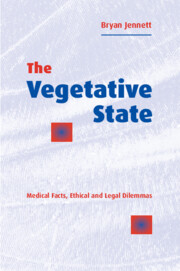Book contents
- Frontmatter
- Contents
- Foreword
- Preface
- Acknowledgements
- An appeal to doctors
- Traumatic decortication
- List of abbreviations
- 1 A syndrome in search of a name
- 2 Diagnosis
- 3 Epidemiology
- 4 Pathology of the brain damage
- 5 Prognosis for recovery and survival
- 6 Attitudes to the permanent vegetative state
- 7 Medical management
- 8 Ethical issues
- 9 Legal issues in the United States
- 10 Legal issues in Britain
- 11 Legal issues in other countries
- 12 Details of some landmark cases
- Epilogue
- Index
Preface
Published online by Cambridge University Press: 21 December 2009
- Frontmatter
- Contents
- Foreword
- Preface
- Acknowledgements
- An appeal to doctors
- Traumatic decortication
- List of abbreviations
- 1 A syndrome in search of a name
- 2 Diagnosis
- 3 Epidemiology
- 4 Pathology of the brain damage
- 5 Prognosis for recovery and survival
- 6 Attitudes to the permanent vegetative state
- 7 Medical management
- 8 Ethical issues
- 9 Legal issues in the United States
- 10 Legal issues in Britain
- 11 Legal issues in other countries
- 12 Details of some landmark cases
- Epilogue
- Index
Summary
The life-sustaining technologies associated with resuscitation and intensive care make it possible now for many patients to survive an episode of acute brain damage so severe that it would previously have proved rapidly fatal. Some such rescued patients make a good recovery, some survive only briefly, whilst others are left with permanent brain damage of varying degrees. In its most severe form this damage leaves the patient without any normal function in the cerebral cortex, and therefore bereft of thought or perception. Although these patients have periods with their eyes open, and are thus apparently awake, they show no evidence of being aware of their surroundings or of having a working mind. They are said to be in a vegetative state. For some this is a temporary state that is followed by some degree of recovery, but others are left permanently vegetative and they can survive like this for many years if life-sustaining treatment and nursing care are provided.
In the 30 years since this state was first described it has provoked intense debate among health professionals, clinical scientists, moral philosophers and lawyers. It is the strange combination of being awake but unaware with no evidence of a working mind that is so disturbing and puzzling. When a patient is left permanently vegetative this is widely perceived to be an outcome of medical intervention that is worse than death. The controversial question then arises as to whether it is appropriate to prolong their lives indefinitely by further medical treatment.
- Type
- Chapter
- Information
- The Vegetative StateMedical Facts, Ethical and Legal Dilemmas, pp. ix - xPublisher: Cambridge University PressPrint publication year: 2002



